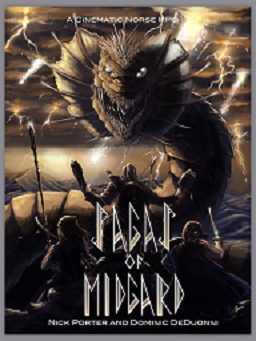Modular: Sagas of Midgard Invades… Well, Midgard
 It’s been awhile, and not because there’s been any shortage of Norse-themed role playing games! In this time, we’ve had the 5e derivative Dragon Heresy, a d6 system called Vikingr, older campaign settings such as Hellfrost and systems such as Trudvang Chronicles, and many others. Our topic on this Odin’s Day, however, is the latest of these: Sagas of Midgard.
It’s been awhile, and not because there’s been any shortage of Norse-themed role playing games! In this time, we’ve had the 5e derivative Dragon Heresy, a d6 system called Vikingr, older campaign settings such as Hellfrost and systems such as Trudvang Chronicles, and many others. Our topic on this Odin’s Day, however, is the latest of these: Sagas of Midgard.
Honestly, I had kind of retired from investment in Viking-age rpgs. My home game hasn’t involved the Norse-specific setting for more than a year, my pocketbook doesn’t drip nine golden rings as Odin’s Draupnir does, and there isn’t much utility in owning much more, since I doubt I’d be able to wrest my gamers from my tabletop version of Fourth Age Middle-earth anytime soon. But the Sagas of Midgard Kickstarter advertised savage, fast-paced gameplay and rules for Raiding—an essential component of the northern milieu and one that I had not ever seen treated to my satisfaction. So I backed a PDF copy, mostly out of curiosity.
When I received it, I realized I was encountering something much more than a few interesting mechanics. This looks like a really good game! You’ll notice that I don’t precisely say that it is simply because I haven’t had a chance to run it yet. Character abilities originate from five separate Domains, and each Domain is governed by a Norse deity. At character creation (and during advancement) players spend points within these domains for specific powers and abilities. These are fueled by a currency called Favor, which characters can obtain through a variety of methods, many of them mechanical. The core mechanic is what the designers call the “Rollover System.” Every task and adversary has a “Rollover Score,” usually between 1 and 100, that a PC has to beat (with a roll of d100) to obtain the effect she wants. There are modifiers, of course, resulting from other game mechanics, and a core feature is that the GM never rolls the dice, something shared by a few other systems and (though denying the GM the pleasure of rolling dice) allows her to focus on storytelling and character interaction.
My main criticism, though, is that the rules explanations can be hard to follow (while recognizing reasons for the authors’ organizational choices). I contacted the authors about this, and they told me that they already had been drafting a “cheat sheet” that should be helpful even to new gamers. And, in the midst of my enthusiasm for their game, I succeeded in getting the creators, Nick Porter and Dominic De Duonni, to agree to an interview.